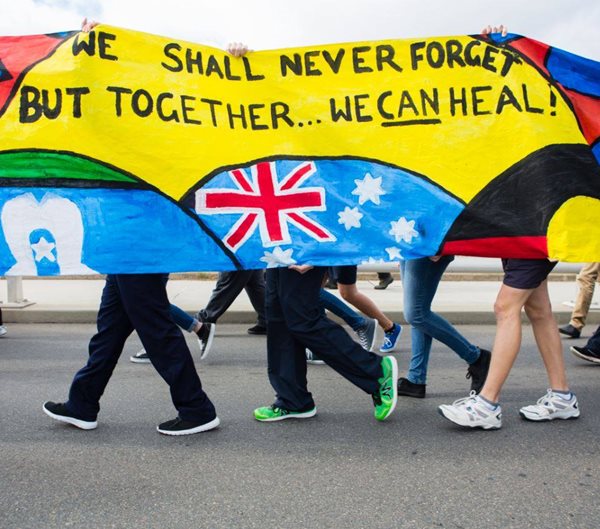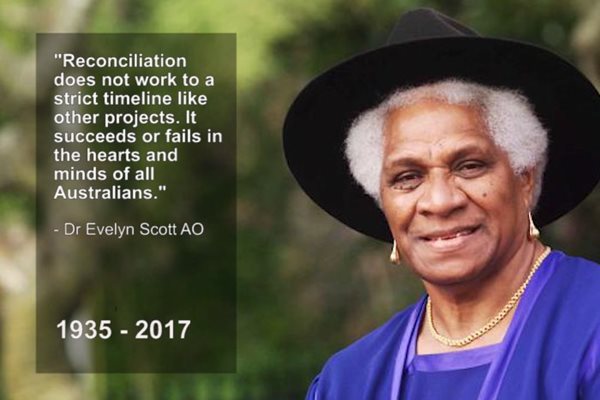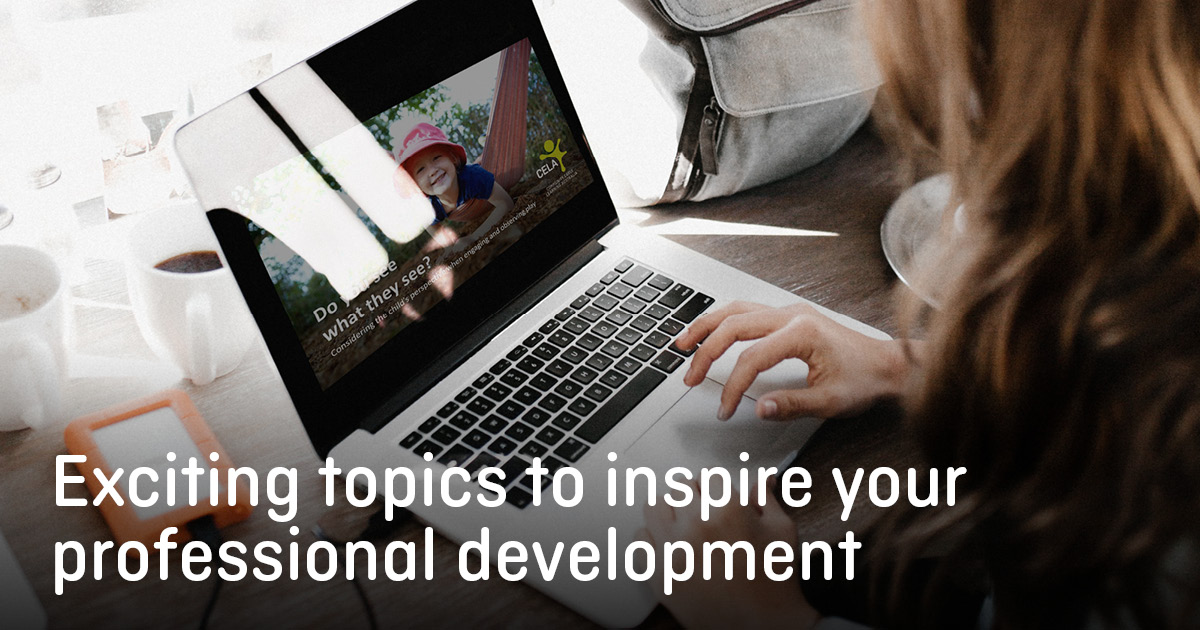From 27 May to 3 June we celebrate National Reconciliation Week. This week marks two significant dates in our history; the successful 1967 referendum, and the High Court Mabo decision. In the early childhood context, it is a time to celebrate and highlight the achievements of Australians in coming together and contributing towards the reconciliation journey.
This week is a special time to actively involve our children in showing our commitment to building relationships and communities which value and celebrate our First Nations peoples.
In our second reconciliation week focused article, Deborah Hoger, a Dunghutti woman and early years indigenous educational resources specialist, outlines how we all have a part to play in this movement and shares some great ideas for how we can demonstrate reconciliation in action.
Written by Deborah Hoger
20 years young – celebrating an important national journey
This year is a particularly significant one for the reconciliation journey.
In 2020 Reconciliation Australia marks twenty years of shaping Australia’s journey towards a more just, equitable and reconciled nation.
It is also 20 years since the reconciliation walks of 2000 when people came together to walk on bridges and roads all across the nation to show their support for reconciliation.
 Image via Reconciliation Australia
Image via Reconciliation Australia
As a twelve-year-old, I walked across the Sydney Harbour Bridge with my family and about 250,000 other people, Indigenous and non-Indigenous, who made their way across the bridge over about a six-hour period. I recall looking upwards at the end of our walk and seeing the words “Sorry” sprawled across the blue sky, not truly understanding the significance of those five letters until much later in life.
Now 20 years later, the theme for this year’s Reconciliation Week is ‘In this Together’, and reminds us that reconciliation is a journey for all Australians, a national journey which cannot be taken alone. It is a reminder that we all have a part to play in this collective movement towards a fully reconciled country.
“Reconciliation is everyone’s business,” says Sally Lawrence, a non-indigenous consultant who for the past 19 years, has worked exclusively with both Aboriginal and Torres Strait Islander communities within the Education context. “If 97% of Australia’s teaching population identifies as being non-Indigenous, we have a moral responsibility to ensure that future generations of children, black or white, get the opportunity to experience, hear and connect with the wisdom and knowledge of the world’s oldest living continuous culture. To not engage would be negligent and professionally irresponsible.”
How we can demonstrate reconciliation in action
Reconciliation in action is demonstrated through actively seeking opportunities to engage respectfully with your local Aboriginal communities and fostering an environment of inclusion. As educators, we can facilitate opportunities for children to participate in localised activities which celebrate First Nations cultures and show respect for Country.
There are many ways that we can share in reconciliation with our young children throughout the year. You could, for example, look at photographs of the 2000 reconciliation walks and take your children on your own symbolic ‘walk’ around your grounds or a park. An activity like that can open up great discussions with your children.
Inviting local Elders into your centre is also a great way to connect with communities and build on local relationships. Together you could read an Indigenous storybook or partake in a craft activity where you and the children can discuss themes like connection, Country and culture.
The reconciliation journey should always be considered as a process of ongoing learning and of growth, and as educators, it is our responsibility to demonstrate to our children our commitment to working collaboratively and culturally respectfully with our Aboriginal and Torres Strait Islander communities. It is also our responsibility to look inwards to our own cultural capacity and take action towards bridging our gaps in knowledge and understanding.
“People need to be able to locate their practice on a cultural competency spectrum and identify actions necessary for movement towards cultural proficiency,” says Carol Vale, Managing Director of Murawin, a majority Indigenous owned consultancy established to inspire individuals and organisations to work more effectively to improve outcomes for Aboriginal and Torres Strait Islander people. “Only then will we be able to shed light on new possibilities and pathways towards reconciliation.”
True reconciliation depends on an ability to hear, listen and value indigenous voices
For generations, Indigenous Australia has been actively and vocally seeking and working towards significant and lasting change, and in 2017, a constitutional convention bringing together over 250 Aboriginal and Torres Strait Islander leaders met at the foot of Uluru in Central Australia on the lands of the Aṉangu people and established what is known as the ‘Uluru Statement from the Heart’.
 Image via Reconciliation Australia
Image via Reconciliation Australia
‘Voice, Treaty and Truth’, were three key elements to the reforms set out in the Uluru Statement from the Heart; the majority resolved to call for the establishment of a ‘First Nations Voice’ in the Australian Constitution and a ‘Makarrata Commission’ to supervise a process of ‘agreement-making’ and ‘truth-telling’ between governments and Aboriginal and Torres Strait Islander peoples.
Makarrata is a word from the language of the Yolngu people in Arnhem Land. The concept of Makarrata captures the idea of two parties coming together after a struggle and healing the divisions of the past. It is about acknowledging that something has been done wrong, and it seeks to make things right. It is in essence, reconciliation at its core.
Reconciliation in action must demonstrate our ability to hear, to listen and to value the words spoken and the desires expressed by Aboriginal and Torres Strait Islander people. When we can do that, we will find ourselves in a much stronger position to pass on the message of reconciliation to our children.
Author Bio: Deborah Hoger is a Dunghutti woman and owner and director of Riley Callie Resources, a business specialising in Indigenous educational resources. She is passionate about using early childhood as a platform to introduce children to the rich depth of knowledge and unique perspectives that Indigenous Australia has to offer.
20 ways to be ‘In this together’
‘In this together’, the theme for National Reconciliation Week 2020 (27 May – 3 June), encourages all Australians to reflect on the part they play on our journey towards reconciliation.
Reconciliation Australia has shared 20 ways that we can be ‘in this together’ during National Reconciliation Week:
- Connect online for the National Acknowledgement of Country at 12 pm Wednesday 27 May
- Tune in for a live debate: Reconciliation Bridge Walks of 2000: Paving the path for reconciliation, Facebook Live 12pm Thursday 28 May
- In Concert Together: Busby Marou, Alice Skye & Jimblah hosted by Christine Anu on Facebook Live and ABC Radio 9pm Friday 29 May
- Capture the QR code on the printed poster with your phone’s camera to make the artwork come alive
- Host an online screening of a Reconciliation Film Club documentary
- Read your virtual copy of Reconciliation News May 2020 on our website
- Host a virtual book club or reading room with our reconciliation Look for a Book reading list
- Download the NRW 2020 video conference background to display in your virtual meetings
- Download the poster to display in your front window. Share a picture on social with tags: #InThisTogether2020 and #NRW2020
- Groove out or chill with our reconciliation channel on Indigitube during Reconciliation Week.
- Learn more about Nikita Ridgeway’s artwork, Reconciliation, a continuing journey of growth and togetherness for NRW 2020
- Read the Uluru Statement from the Heart and share with your friends
- Learn about the history of the Reconciliation Bridge Walks, held across Australia 20 years ago
- Share your photos and memories of the Reconciliation Bridge Walks on social with the hashtags: #InThisTogether2020 and #NRW2020
- Watch the documentary In My Blood it Runs via Vimeo and check out their free screenings for schools
- Follow Reconciliation Australia on social on Facebook, Instagram, and Twitter
- Cook a dish using native ingredients from your local area and share a photo
- Support Aboriginal and Torres Strait Islander businesses and enterprises
- Get creative and hold your own virtual NRW 2020 event with family and friends
- Stay safe and healthy, and be involved with your local community – because we are #InThisTogether2020.
*(all times AEST)
Have you seen our new training calendar?
.jpg?width=600&height=315)
Although our popular face to face sessions are on hold, we have developed a calendar of interactive and thought-provoking online learning to help you through COVID-19 and continue your professional learning.
Delivered in a variety of 2-3 hour sessions or 2 part series, our online learning has been designed to provide information you need to know now, inspire ideas and build Teacher Accreditation hours.
We have developed new sessions to enable Nominated Supervisors and Approved Providers to navigate their responsibilities in relation to COVID-19, as well as training to support the wellbeing of early education professionals during this uncertain period.
We have also taken many of our popular courses and designed them to enable your continued learning.
View our sessions